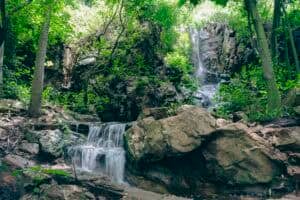Dangerously high levels of the bacteria have been found in streams and rivers.

Catastrophic levels of the highly dangerous bacteria, Escherichia coli, more commonly known as E. coli, have been recorded in dams, rivers and streams in the Govan Mbeki municipal area in Mpumalanga, Ridge Times reports.
This water pollution does not affect the drinking water supply to most households, as households in Govan Mbeki Municipality receive their water directly from Rand Water, but the main concern is that many informal settlements rely on these waterways for everyday use, such as drinking, cooking, washing, watering vegetable gardens and providing drinking water for animals.
According to Tim Denny, DA councillor, one of the main reasons for the high level of the dangerous E. coli bacteria in the water, is that raw, untreated sewage flows into them daily.
“Overflowing sewers, blocked drains, faulty sewage pump stations and in certain areas a complete lack of proper sewer systems, cause thousands of litres of untreated sewage to flow into our streams and rivers.”
After pinpointing problem areas in the area, the DA and AfriForum took water samples at five different sites.
These were analysed and, apart from other pollutants that were also elevated, every sample contained catastrophically high levels of the E. coli bacteria.
E. coli is particularly dangerous because an infection with this bacteria can result in severe illness and even toxic shock syndrome. Early signs of an E. coli infection include fever (37.7C to 38.3C), nausea, vomiting, stomach cramps, diarrhoea, general malaise and appetite loss.

READ MORE: Plastic pollution poses threat to oceans
The main cause of such elevated levels of the bacteria in a water system is often due to pollution by human waste. At present, there are a number of problem areas in the municipality where sewage is flowing into waterways for many different reasons. A lack of proper infrastructure in informal settlements is only one of the reasons.
In Leandra, Lebohang and eMbalenhle, residents are forced to dig furrows from their homes into the street and eventually into waterways, or else live with pools of wastewater around them.
A more pressing problem comes from sewage pump stations in the area that are faulty or that cannot deal with the high volumes of humans waste that pass through them.
In eMbalenhle, the main sewage treatment plant is pumping what appears to be untreated sewage into Brak River, polluting the Vaal catchment area.
“Apart from the obvious health risks involved, residents must understand that the cost of their water from Rand Water will only increase as the water provider is forced to use more and more chemicals to purify water for human consumption.”

Denny has brought the looming environmental crisis under the attention of the municipality, but has not received any further communications that indicate a way forward. “We are risking the lives of our most vulnerable residents, people who use local streams and rivers for washing, cooking and other household purposes.
“We cannot let this slide, action must be taken to avert a serious health crisis.”
Baker and Denny will approach the Green Scorpions to investigate the issue, and are contemplating which steps to take next.
“This is an infringement of basic human rights and the possibility of laying criminal charges remains open.”
– Caxton News Service
For more news your way, follow The Citizen on Facebook and Twitter






